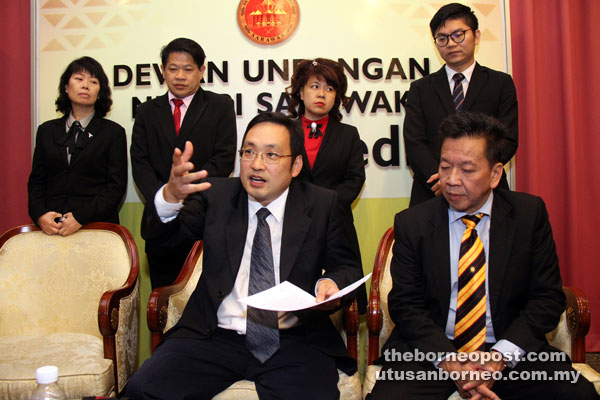
Yong (standing, second right) at a press conference on the suspension of Kota Sentosa assemblyman Chong Chieng Jen (seated, left) by the Assembly. With them are fellow elected representatives David Wong of Pelawan on Chong’s left, as well as (standing, from left) Irene Mary Chang of Bukit Assek, Ting Tiong Choon of Pujut and Wong King Wei of Padungan.
PENDING assemblywoman Violet Yong has proposed the seting up of state-based companies to explore and extract natural gas from gas fields as one of the ways for the state government to reclaim the state’s rights over its natural resources.
“We got to remember what is ours is ours. One way to go about it is to set up our own companies to explore and extract the natural gas from the gas fields and have our own liquefied natural gas (LNG) refinery plant and we can call it SLNG (Sarawak Liquified Natural Gas).
“Don’t let Petronas and MLNG keep robbing our oil and gas. Perhaps there would come a day when MLNG is forced to purchase LPG from SLNG. We must dare to dream the ‘impossible dream’,” she said in her debate on the Distribution of Gas Bill 2016 at the sitting yesterday.
Yong quoted Suara Petroleum Group (SPG)’s statement released on Nov 17 that said: “No such consenting law was ever passed by the Sarawak legislature. Sarawak is therefore fully within its constitutional rights to take back its petroleum resources and manage the same on its own. All of Petronas operations in Sarawak therefore are arguably unconstitutional and illegal.”
She believed that every Sarawakian would support the move.
“We do not have to worry about Petronas. If Petronas is not happy about the way we proceed, challenge them to lodge police report and get the police to charge our state government and I would be very much happy if Petronas could even bring our state government to international court to litigate the matter.
“Let the international court decide who has the sole rights and power of the natural resources within Sarawak’s waters. Our state government must be daring and take a firm stand on the matter,” she said.
Yong pointed out the ridicule of Sarawak having to ‘beg’ for its own resources.
“Under the principal agreement signed between Petronas and the state government in April this year, 250 million standard cubic feet per day of natural gas are supplied to Sarawak Energy Bhd (SEB)’s power plant at Tanjung Kidurong and 1,200MW power plant in Samalaju Industrial Park.
“The remaining 200 million standard cubic feet per day of natural gas are to be supplied as feed stock for the petrochemical industry.
“These natural gas resources are ours and belong to Sarawak; and we allow Petronas to dig and take our resources endlessly and in return, we have to beg and only been given the supply of 450 million standard cubic feet per day out of the nearly 5,000 million standard cubic feet per day production.
“If Sarawak were asked to pay for the supply of these 450 million standard cubic feet per day of natural gas, then we are stupid at the highest level. I would like the minister to enlighten this august House on the price we pay for the current supply of natural gas from Petronas – if there were a fee charge for it.”
Yong also called on the minister-in-charge to inform how Sarawakians would benefit from these 450 million standard cubic feet per day of natural gas supply.
“Before the state government fixes the tariff of gas, please think of the people’s plight.
“The people are also asking for the government to set up LNG facilities at all petrol stations. This will enable the ‘rakyat’ (people) to substitute petrol consumption of their vehicles with LNG gas.
“There should also be clauses regulating the safe use of pipes, safety on gas fittings, protection of buildings, clogging precautions, testing and purging of pipes, as well as safety precautions on gas appliances,” she said.
